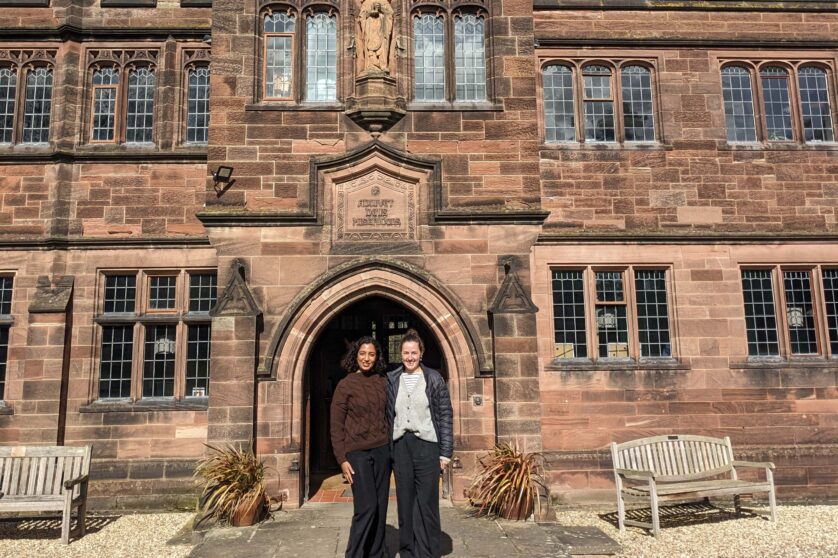Two of ICTD’s PhD students, Adrienne Lees and Sripriya Srivatsa, recently spent three days at Gladstone’s Library in North Wales on a writing retreat. The library was built in 1902, following a bequest from William Gladstone, and has hosted a long list of distinguished writers and scholars working on their oeuvre (no pressure on our students!). It is also UK’s only residential library, with accommodation and a café on-site, taking real world considerations like buying milk and getting the bus to campus out of the equation for a few days.
We caught up with Adrienne and Sripriya to hear their reflections on this experience.
1. Taking time away can synthesise a non-linear research process
Sripriya: My PhD journey so far has been, like many others, very chaotic. I changed topics completely, explored research methods that I was entirely unfamiliar with, and travelled to four countries to collect data. This research process has resulted in the production of various documents – handwritten fieldnotes, reports, do-files, graphs, annotated bibliographies, and several partially ticked to-do lists. Having this dedicated time at Gladstone’s library gave me the much-needed push to collate various pieces of information into an extended PhD outline. It can be very tempting to think that any amount of data collected is insufficient evidence for your key argument – so you may want to keep chasing that one more interview or focus group. But having taken the time to take stock of the literature I have engaged with, and the data I have collected, I found some confidence in just sitting down and putting what I know down on paper.
2. Keep your notes in one place
Sripriya: I use different tools for various aspects of research. Zotero and Zotero notes for annotating literature reviews, Snippets Lab for explaining my code, Notability for digital handwriting, Notion for sentence outlines of PhD chapters, Word for fieldnotes, a physical notebook for everything else, and the actual PhD is written on Overleaf. I have learned the costly lesson that too much ambitious organisation can actually be a bad idea. In the two years I have spent on this PhD, all of these tools have several vital pieces of information which I have had to dig up to then input onto my Overleaf document. This was time-consuming, not as intuitive as I wanted it to be, and I am certain that there are important pieces of information that I have now lost. My suggestion to anyone who is in their early PhD days is to stick to one or maximum two forms of collecting information. And if that is too few, then set up an excel spreadsheet where you keep track of the documents/code you are producing. Your final year writing-the-PhD-self will be so grateful.
3. Treat writing as an iterative process
Adrienne: Stuck in the weeds of a research project, it’s tempting to tell yourself that you’re not yet ready to write. Your analysis isn’t quite finished, your interviews aren’t fully transcribed, or your do files aren’t properly polished. Writing up can feel like a final step, something you can only start once you know all your results. Particularly if you feel daunted by a blank page. That was certainly the headspace I was in before this retreat. But having some dedicated writing time has been invaluable in solidifying what the next steps should be. I focussed on writing two sections: my motivation for studying tax compliance costs and the major measurement issues in the literature. After three days of engaging again with the literature that inspired my project in the first place, I left the retreat feeling more focused on the three main contributions my paper will make. This brings me to my next lesson.
4. You don’t really know your narrative until you try to write it down
Adrienne: I’ve spent over a year talking about my research on tax compliance costs and writing short project summaries for things like ethics applications, so I thought I had a pretty good handle on what the narrative and framing of my paper would be. But when it came to actually writing it down in a logical way, I realised my thoughts were not nearly as logical and orderly as I had assumed. But after a few hours with no distracting Teams messages, email traffic, or intrusive thoughts about what I’d cook for dinner, I had a reasonable draft of an introduction. This has also been invaluable in informing the next steps of my analysis, as I feel much more focused on the core issues, rather than distracted by minor tangents. One tip I’d recommend is working through a sentence outline for your paper. This is more than a collection of section headings, but rather a more fleshed-out product, with a main topic sentence for each paragraph of your argument. I also found it helpful to include the key references for each paragraph.
5. Find a writing buddy
Adrienne: We are at similar stages of our PhDs, although we don’t work on the same topic and have very different methodologies. Despite this, we found having a friend along for the journey invaluable. Not only does a friend make coffee breaks and post-prandial walks more interesting, but they are also a mechanism for keeping you accountable and checking in with how you are feeling (and sometimes how many sentences you’ve managed to write). It was also useful to use each other as a sounding board for ideas we were trying to work through, bringing fresh perspectives to a topic we probably spent too much time thinking about. PhDs are famous for being a lonely journey, so having someone you can count on, and one who has a deep understanding of your lived academic experience, is an invaluable asset.
Bonus: A charming change of scenery can do wonders for your productivity. We highly recommend Gladstone’s Library to all aspiring writers!
